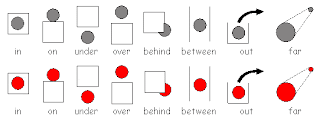Christmas Vocabulary
advent | the arrival of someone or something important |
| Advent | the coming (or second coming) of Jesus Christ; the month leading up to Christmas |
| angel | a spiritual being acting as a messenger of God (usually shown as a human being with wings) |
| berry | a small round fruit |
| Bethlehem | the small town in the Middle East believed to be the birthplace of Jesus Christ |
| candle | a cylinder of wax with a central wick (like string) which burns to produce light |
| chimney | a vertical pipe in a house that allows smoke and gases to escape from a fireplace (Father Christmas traditionally enters a house through its chimney) |
| Christ | the title of Jesus (also used as His name) |
| Christian | a person who believes in Christianity; also an adjective |
| Christianity | the religion based on the teachings and person of Jesus Christ |
| Christmas | the annual Christian festival celebrating the birth of Jesus Christ (Christmas Day is on 25 December) |
| Christmas cake | a rich fruit cake covered with white icing, eaten at Christmas |
| Christmas card | a greetings card that people send to friends and family at Christmas |
| Christmas carol | a religious song or popular hymn that people sing at Christmas |
| Christmas Day | 25 December, the birthday of Jesus Christ |
| Christmas Eve | the evening or day before Christmas Day (24 December) |
| Christmas holidays | the holiday period for about a week before and after Christmas Day |
| Christmas present | a gift or present given at Christmas |
| Christmas tree | an evergreen tree (often a spruce) that people decorate with lights and ornaments at Christmas |
| cracker | a decorated paper tube that makes a sharp noise ("crack!") and releases a small toy when two people pull it apart |
| decoration | something that adds beauty; ornament |
| egg-nog | a traditional Christmas drink made of alcohol with beaten eggs and milk |
| Father Christmas | an imaginary being who brings presents for children on the night before Christmas Day (also known as Santa Claus) - traditionally an old man with a red suit and white beard |
| fireplace | a partly enclosed space in a house where people light a fire for warmth |
| frankincense | a gum used for incense, one of the gifts that the three wise men gave to Jesus |
| gold | a yellow precious metal, one of the gifts that the three wise men gave to Jesus |
| holly | an evergreen plant with prickly dark green leaves and red berries |
| Jesus | the name of Christ, the central figure of Christianity (believed by Christians to be the Son of God) |
| Joseph | the husband of Mary (the mother of Jesus) |
| magi | the wise men from the East who brought gifts for the baby Jesus |
| manger | a trough for food for horses or cattle (used by Mary as a cradle or bed for Jesus) |
| Mary | the mother of Jesus |
| mistletoe | a parasitic plant with white berries, traditionally used as a Christmas decoration |
| myrrh | a gum used for perfume or incense, one of the gifts that the three wise men gave to Jesus |
| nativity | the birth of a person |
| the Nativity | the birth of Jesus Christ |
| nativity play | a play that people perform at Christmas based on the birth of Jesus |
| new year | the start of a year; the period just before and after 1 January |
| New Year's Day | 1 January |
| New Year's Eve | 31 December |
| ornament | an object that adds beauty to something; a decoration |
| present | a thing given to somebody as a gift. |
| reindeer | a deer with large antlers found in some cold climates (believed to pull the sleigh for Santa Claus or Father Christmas) |
| Santa Claus | an imaginary being who brings presents for children on the night before Christmas Day (also known as Father Christmas) - traditionally an old man with a red suit and white beard (Santa Claus may be based in part on the historical figure of Saint Nicholas.) |
| shepherd | a person who looks after sheep |
| sleigh | a sledge or light cart on runners pulled by horses or reindeer over snow and ice |
| snow | water vapour from the sky that falls as white flakes and covers the ground |
| star | a bright point in the night sky which is a large, distant incandescent body like the sun |
| the star of Bethlehem | the star that announced the birth of Jesus and guided the wise men to find Him |
| tinsel | a decoration consisting of thin strips of shiny metal foil, traditionally used at Christmas |
| turkey | a bird like a large chicken, traditionally eaten at Christmas |
| white Christmas | a Christmas with snow on the ground |
| Xmas | abbreviation or informal term for Christmas |
Christmas Expressions
- Merry Christmas!
- Happy Christmas
- Happy New Year!
- Merry Christmas and a Happy New Year!
- Wishing you a prosperous New Year
- All the best for the coming year
- Seasons Greetings!




.jpg)

